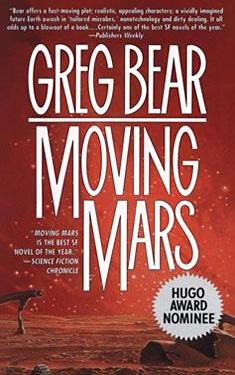Greg Bear
Completed 2/14/2021, Reviewed 2/14/2021
4 stars
I was surprised by this book. It’s yet another Martian epic, this time by one of the masters of hard sci fi. I didn’t think I’d like it, as I feel Mars-ed out. But I really liked it, after a fashion. I hard a hard time staying interested in the first half of the book, but suddenly, I found myself engrossed and involved with the plot. It’s a very political book, featuring the attempts of Mars colonists to form a central government from the self-ruled family-based syndicates that had developed, a move that threatens the three mega-nations of Earth. By the end, I realized that what I thought was an excruciatingly slow build-up was necessary to set the scene for the fast-paced second half. I’m glad I stuck with it. This book won the Nebula Award for 1994 and was nominated for several others, including the Hugo. Interestingly enough, it beat Robinson’s Green Mars for the Nebula, but lost to it for the Hugo.
The
book is the memoir of Casseia Majumdar.
The book begins with her involvement in a student uprising against the “statists”
who want to form a central government and fall under the jurisdiction of
Earth. The statists are expelled. During the event, she meets Charles Franklin,
a brilliant physics student who falls madly in love with her. When they meet after things on Mars return to
normal, they have a brief affair, but she rejects his sudden proposal. They go their separate ways, Cassie to finish
studying political science, Charles to do secret innovative research. Cassie gets an internship to accompany her
third uncle to Earth. He is acting as an
ambassador from Mars despite not having a centralized government. On the trip, she finds out how menacing the
Earth’s mega-nations are. When she comes
back, she becomes part of a new central government movement. She comes across Charles again, who has
discovered a way to communicate and move large objects over vast distances
simultaneously. When the Earth begins
making violent overtures, it seems their only hope is (dah dah daaaaaah) moving
Mars.
I
thought this book was going to be one long tedious space opera, or worse, what
I would call court drama in a fantasy novel.
On the contrary, I found it to be quite a smart piece of fiction. The science is pretty hard, for which Bear is
celebrated, but I found it somewhat straight forward to follow. It enhances the story rather than eclipsing
it. The characters are in the forefront
as well, being well-developed. Even the
bad guys get decent development. I didn’t
like Cassie at first. She’s about twenty
when the book begins and comes across as an annoying teenager, joining the
anti-statist uprising on a whim. I didn’t
like her treatment of the equally annoying lovelorn Charles. That’s what made the first half of the book
so difficult for me to like. But as it progressed,
they both grew into brilliant, yet fairly normal adults. By the time they finally meet again, I found
I really liked them.
The
writing is good, (eventually) well-paced, almost journalistic in style, as one
would expect from a memoir. It’s the
dialogue that really fleshes out the characters and builds the world. This is the third book in a series, but it
stands alone and doesn’t rely too much on info dumping to fill you in on how Mars
has developed or the state of the politics of Mars and the Earth. I thought it was all described quite organically. The ending of the book is also very
realistic. It’s messy, not a hunky-dory
tidy ending.
I
give this book four stars out of five. It
starts out very slowly, but if you stick with it, I think you'll enjoy it.

No comments:
Post a Comment